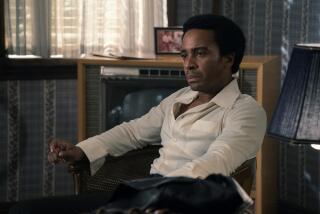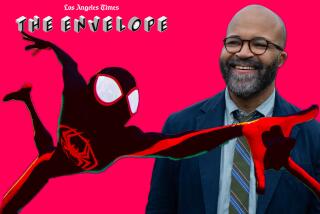Movies : Is There Ruhm for Another? : Blake Edwards attempts to revive the once hugely successful ‘Pink Panther’ series, but will a new generation fall for an Italian comedian playing the son of the bumbling Clouseau?
It has been nearly 30 years since Peter Ustinov walked away from a role in a Blake Edwards picture and inadvertently cleared the way for one of the most successful comedy series in movie history. Ustinov had agreed to play the part of Jacques Clouseau, the bumbling French inspector Edwards and co-writer Maurice Richlin had written into their diamond caper comedy “The Pink Panther.” But days before production was to begin, he changed his mind.
“We had sets built and everything, we had to find another actor fast,” Edwards recalled, recently. “Our only alternative was to sue Ustinov, and that would have been non-productive.”
For the Clouseau fans among us, it is hard to think of anyone other than Peter Sellers playing him, but it was fate born of desperation.
“I didn’t know much about Sellers,” Edwards said. “He had finished ‘Dr. Strangelove,’ but it wasn’t released yet, and the only thing I’d seen him in was ‘I’m All Right Jack.’ He was this pudgy Englishman speaking cockney. When someone suggested him, I thought, ‘He doesn’t remind me of the character.’ But we were desperate, so I said, ‘Get him in, let’s do it.’ ”
Since they got him in and did it, the Clouseau movies have grossed more than $300 million worldwide, made an international star of Sellers, and turned the series’ insouciant, animated pink mascot into a merchandising phenomenon.
There have been a long-running “Pink Panther” TV cartoon series; an endless variety of Panther dolls, clothing, puzzles, comic books, video games and food stuffs, and the character often hires out for corporate work. He has been the official spokesman for Owens-Corning in the United States for 14 years, and IBM-Europe, looking for an equally recognizable image, picked the panther to replace Charlie Chaplin in its advertising.
But the driving force for the franchise, of course, has always been the movie series, and, like a pop star going on tour to boost album sales, the Pink Panther is returning to the big screen, appearing in the opening and closing credits of “Son of the Pink Panther.”
The new Clouseau movie, the eighth overall, the first in 10 years, and the third since Sellers’ death in 1980, stars Italian actor-comedian Roberto Benigni as Jacques Clouseau’s illegitimate son, a hyperkinetic bicycle cop who inherited his father’s genes for studied incompetence and mangled syntax.
Benigni is a huge star in Italy, and though he uses some of Sellers’ Clouseauisms, his is a much broader and more physical comedy performance. Sellers’ Clouseau was uptight and comically disoriented; Benigni’s Clouseau Jr. is an amiable clown, vulnerable and unself-consciously scattered.
Edwards tried to perpetuate the series with a new character before, in the 1983 “Curse of the Pink Panther,” and failed, largely because Sellers fans would not accept a substitute. The panther merchandise continued to move--an MGM/UA executive said there have never been fewer than 160 licensees--but how strong the cat will be in the next century may depend entirely on whether moviegoers are ready for a second-generation Clouseau.
For those unfamiliar with the Clouseau series, it began in 1964 with “The Pink Panther,” which Edwards synopsizes as “a story about a police inspector whose wife is sleeping with the jewel thief he’s trying to catch.” The thief was played by a suave David Niven and Clouseau’s wife by Capucine.
That was followed the same year by “A Shot in the Dark,” the only Clouseau movie not involving the theft of the museum diamond called the Pink Panther, because of the panther-shaped flaw at its center. The movie was adapted from a French play, and Edwards, who was brought in as a last-minute replacement for Anatole Litvak, merely substituted Clouseau for one of the main characters. And Sellers, who had already been cast in the movie, responded with the defining Clouseau performance.
Eleven years later, when both Edwards and Sellers needed career boosts, they teamed up for “The Return of the Pink Panther,” followed in 1976 by “The Pink Panther Strikes Again,” and in 1978 by “Revenge of the Pink Panther.”
Two years after Sellers’ death, Edwards assembled a film crew and shot two movies simultaneously, “The Trail . . . “ and “The Curse of the Pink Panther,” the first intended as an homage to Sellers, the second as a vehicle for introducing a new character into the series.
Neither film was successful. Many people were offended by the use of outtakes and clips of Sellers from previous “Panther” movies in “Trail,” which followed a makeshift story about a reporter trying to find the missing Clouseau. And they were appalled at the idea of using Ted Wass’ bumbling New York cop, Clifton Sligh, as a Clouseau soul mate in “Curse.”
Edwards acknowledges having miscast Wass, an amiable actor with no gift for physical comedy, in the “Curse,” but it’s doubtful anyone could have stepped in that soon after Sellers’ death and found acceptance.
Edwards still defends both “Trail” and “Curse” as good movies, and blames their box-office failures on MGM/UA for not supporting them. As he sees it, by not promoting them properly, the studio not only sealed their fates, but put the entire Pink Panther franchise at risk.
In a spectacular public feud, Edwards sued MGM/UA for more than $1 billion, and MGM/UA countered that he’d gone over budget on both movies, though presumably by something less than the $350 million its suit demanded as satisfaction.
Edwards says all the lawsuits were settled out of court, and that he bears no grudge against MGM, which is under new management.
(The management was getting newer as he spoke. The next day, it was announced that under a new financial structure, studio chief Alan Ladd Jr. was being replaced by former Paramount boss Frank Mancuso.
(Does the decision by Mancuso’s MGM not to screen “Son of the Pink Panther” for critics mean it, too, is being abandoned? Producer Tony Adams says no, “it’s the kind of movie that critics should see with regular audiences.”)
In any event, if “Son of the Pink Panther” doesn’t draw a crowd, the Clouseau run could end at eight (nine if you count the 1968 Bud Yorkin-directed “Inspector Clouseau,” in which Alan Arkin played the title role, but why would you?).
Edwards, relaxing in a Beverly Hills hotel room following an preview screening of “Son of the Pink Panther,” reminisced about his seven Panther movies, and, specifically, the four he did with Sellers, whom he believes was “a certified paranoid schizophrenic.”
“If there was one behavioral quality that you could guarantee, it was that if he was coming off a very bad time, if he hadn’t had a successful film, he was cooperative, he was funny, he was determined to come back. If, however, he had been successful, he was so arrogant and so impossible you didn’t want to go to work.”
The star was also irrationally superstitious, he said. “He walked around the set talking to God, talking to his dead mother. He wouldn’t allow anyone on the set who was wearing purple. He brought a priest to a press conference so it would be successful. If you saw that this was going to be one of those films, all you could do was breath deeply and hang on.”
When the “other” Sellers showed up, working with him was more fun than the movies themselves. Sellers was always doing things during takes that would send crew members or other actors into hysterics, Edwards said. There was one particular scene, from “A Shot in the Dark” where Clouseau interrogates a roomful of murder suspects, that Edwards didn’t think he would finish.
“It was a hard scene to shoot because there were a lot of people in it, and they were cracking up at Sellers. One person would start laughing, then someone else. Sellers was the worst! Finally, I put some money in the center of the room and said, ‘I don’t care who it is that breaks up, they have to match the pot.’
“I’ll always remember this because George Sanders was in the scene, and he’s someone who usually just did his role and went to sleep. He didn’t get actively involved. But when Sellers started using these words, ‘a mooth in the closet,’ ‘a buhmp on the head,’ Sanders fell down and wept like a cocker spaniel. When he lost it, I lost it. I had to match the pot and there was a fortune in it.”
The good times came at a price, Edwards said, and there came a time when it wasn’t worth it. Shortly before his death, Sellers had an idea for a story in which Clouseau finds romance, and MGM was anxious to do it. Edwards agreed to relinquish the rights (for a reported $3 million), but chose not to direct it himself.
Sellers died before production began, and the script with him.
Producer Tony Adams said they began developing a story for the latest Pink Panther movie about four years ago, and had approached Gerard Depardieu about playing Clouseau’s son. “Gerard was very interested, but the project wasn’t ready, and his schedule changed.”
Edwards said he learned from the experience with Wass that he needed an actor who could take command of the screen, and found his man, half the size and twice as loud as Depardieu, in Jim Jarmusch’s “Down by Law,” and in Benigni’s own Italian film “Johnny Stecchino.”
“He is much more physical than Sellers was, and he has a completely different appeal,” Edwards said. “I wanted someone who you could believe was Clouseau’s illegitimate son, but had a personality of his own. Roberto certainly has a personality of his own.”
Whether “Son of the Pink Panther” inspires a “Return of the Son of Pink Panther” or not, Edwards said there is a chance Clouseau will live again, on stage. He said that he has been approached about doing “A Shot in the Dark” as a play.
“It was originally done on stage, and I think it would make a good musical,” said Edwards, who’s mounting an $8-million musical version of his film “Victor/Victoria” on Broadway next year. “If (“Victor/Victoria”) is successful, I’m going to consider doing it.”
The Pink Panther will be watching.
More to Read
The complete guide to home viewing
Get Screen Gab for everything about the TV shows and streaming movies everyone’s talking about.
You may occasionally receive promotional content from the Los Angeles Times.






